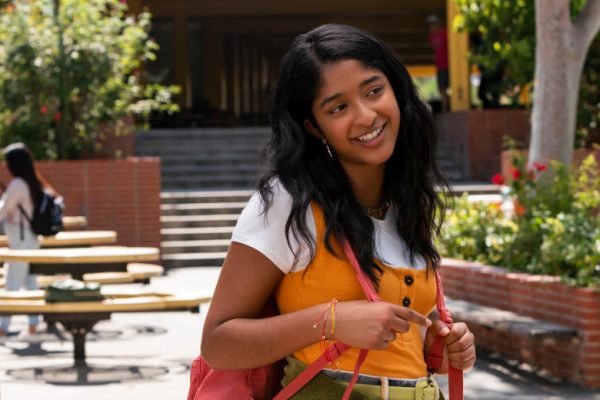Television Review: Netflix’s Teen Comedy “Never Have I Ever” — Quirky to a Fault
By Sarah Osman
Never Have I Ever suffers from an identity crisis: the show doesn’t want to face that it is just another Netflix teen comedy, albeit with its share of engaging moments.

Maitreyi Ramakrishnan in Netflix’s Never Have I Ever.
Written and created by Mindy Kaling and Lang Fisher, Never Have I Ever relies on quirk. Starring Maitreyi Ramakrishnan, the series revolves around Devi, a high school sophomore. We are introduced to her as she prays to Hindu gods to be cool, hot, and to land a boyfriend — as well as to make her arms no longer look “like the floor of a frickin’ barber shop.” Via narrator John McEnroe (more on that in a minute), we quickly learn that Devi’s beloved father died in the middle of one of her concerts and she was temporarily paralyzed. Only the sight of her crush, Paxton (Darren Barnet), could inspire her to walk again. This is a lot to take in the first 10 minutes of a show, and the mix of idiosyncrasy and melodrama doesn’t stop there. Devi has a stunning cousin living with her who is dreading an arranged marriage. And she has two best friends: one is a drama geek, the other questions her sexuality.
The first few episodes of Never Have I Ever run by at such breakneck speed it is hard to take things in. There are plenty of charming moments, but it’s difficult to make much of Devi, other than the fact that she is a horny nerd with a sassy mouth. In that way she resembles many other recent minority heroines (Julia in Erika L. Sanchez’s I Am Not Your Perfect Mexican Daughter comes to mind). This strain of teen protagonists have been crafted to be modern day versions of Holden Caulfield (though much more likeable). It takes at least three to four episodes to begin to care about Devi; it turns out she is avoiding mourning her father’s death and grappling with her extreme physical reaction to his demise. The show becomes far more powerful when it takes on Devi’s grief, but these scenes don’t pop up until the later half of the season. More early on would have been of value in making Devi a character we sympathize with.
Netflix brings together a vibrantly multicultural cast, which makes sense considering that the show takes place in southern California (one of the most diverse areas in the world). Understandably, some characters are more interesting than others. Devi’s best friend, Fabi (Lee Rodriguez), is struggling to come to terms with being gay, particularly dealing with her traditional parents (one is black, the other is latino). Her rival for their affection, Ben (Jaren Lewison), is having trouble handling the pressure to succeed. Devi’s other best friend, Eleanor (Ramona Young), is a bit of a yawn — she is an uninspired SNL sketch. She mechanically screeches stereotypical “theater kid” lines (She sings Broadway show tunes! She dresses as a flapper!). Her reason to exist (plotwise) is to drum up gossip.
Now to McEnroe’s narration, which is more confusing than entertaining. Unlike Ron Howard’s sardonic voice-over in Arrested Development, McEnroe’s attitude is brash and unfunny. Howard worked in Arrested Development because the show was surreal to begin with. But Never Have I Ever is not nearly as wacky as it would like us to think. It suffers from an identity crisis: the show doesn’t want to face that it is just another Netflix teen comedy, albeit with its share of engaging moments. Why McEnroe? He is there because of Devi’s father’s love for the bad boy player and for tennis. That’s it … Never Have I Ever would be far more powerful if it was narrated by Devi herself.
And there’s another strange facet to the show. Devi’s Indian heritage isn’t touched upon much. In one episode, Devi and her family celebrate Ganesh Puja, but the focus is more on the teen trying to become friends with a college counselor than on what it means to observe the holiday in an America suspicious of difference. Devi’s cousin Kamala (Richa Moorjani) is the only character who offers some insight into what it means to live as an Indian here. She is trying to balance what she wants to do with her life with her family’s plans. Kamala’s predicament is both compelling and amusing (she watches 16 hours of Riverdale and concludes that she should run to the man she loves). It’s never dramatized why Devi doesn’t like her cousin (maybe she’s too Indian?). Perhaps it is because Kamala’s story is so much more intriguing than hers.
On the one hand, Never Have I Ever is a delightful binge watch. Parts of it are endearing and will speak to anyone who has undergone the horrors of high school. But the show doesn’t really know what it wants to be. It juggles too many themes and plot points — some serious, some superficial. If the series is intended to just be a fun watch, so be it. But Never Have I Ever seems to be trying to deliver some sort of poignant social message — if only it could figure out what it was.
Sarah Mina Osman is a writer living in Los Angeles. She has written for Young Hollywood and High Voltage Magazine. She will be featured in the upcoming anthology Fury: Women’s Lived Experiences under the Trump Era
Tagged: John McEnroe, Lang Fisher, Maitreyi Ramakrishnan, Mindy Kaling, Never Have I Ever

Glad to see you’re writing again, during this pandemic.
Love reading your reviews!